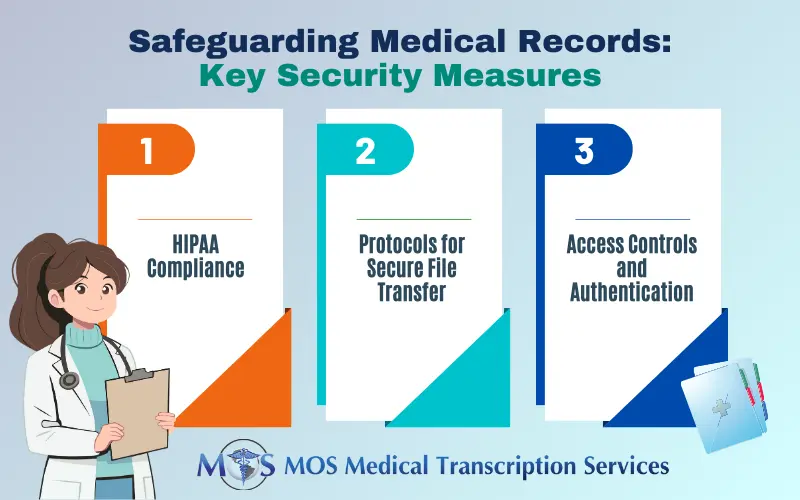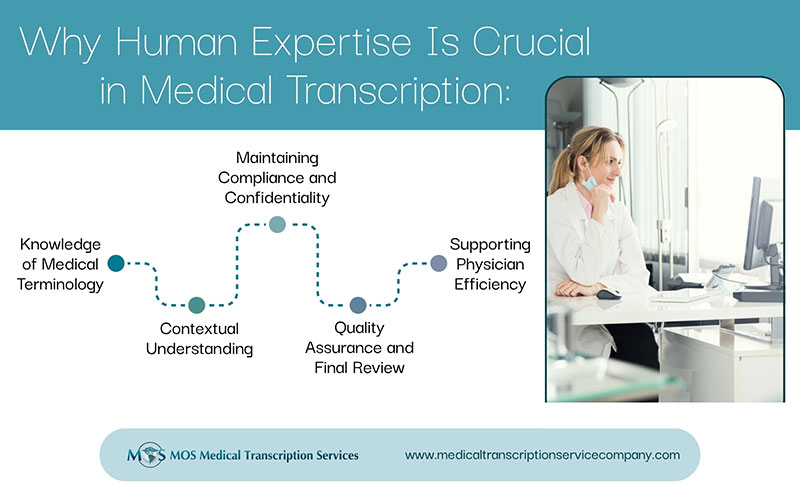
Table of Contents
The process of turning spoken medical reports narrated by healthcare professional into written text requires specific skills. Hospitals and medical practices are increasingly relying on outsourced medical transcription services to ensure that the patient’s medical history is appropriately recorded for continuity of care, compliance, and insurance purposes. However, as third-party vendors are often a target of data breaches, it’s important that healthcare entities partner with a HIPAA-compliant medical transcription company for their EHR-related documentation requirements.
The Significance of Medical Transcription
Transcription of medical dictations involves more than just translating speech to text; it also involves obtaining vital health data that has an immediate bearing on patient treatment. For the purposes of making treatment plans, making diagnoses, and monitoring patient progress, accurate medical records are crucial. In order to make sure that these records are correct, current, and in compliance with healthcare laws, medical transcriptionists are essential.
- Improve Patient Care: Its immediate effect on patient treatment is one of the main reasons medical transcribing is so important. Whether it’s a surgical summary, discharge report, or consultation note that a doctor dictates, the transcriptionist has the duty to make sure that every detail is precisely captured. This degree of accuracy guarantees continuity of care, reduces the risk of medical errors, and gives other healthcare professionals access to the data they need to decide how best to treat a patient.
- Assisting with Healthcare Functions: Additionally, medical transcribing aids in the general operations of healthcare facilities. Medical records that are accurate and well-organized are necessary for insurance claims, coding, and billing. They guarantee that patients receive accurate bills and that healthcare practitioners are paid for the services they render. Furthermore, these records must be accurate and comprehensive because they are frequently needed for legal purposes, like as audits or malpractice cases.
- Compliance with Laws and Regulations: Medical records are not only treatment records; they are also legally binding documentation that may be needed for insurance claims or legal actions. Strict laws, such as the Health Insurance Portability and Accountability Act (HIPAA) in the United States, which requires the appropriate handling and preservation of patient information, regulate the healthcare sector. Healthcare practitioners are guaranteed to adhere to these rules through precise and thorough transcribing. If these guidelines are not followed, the healthcare practitioner may face fines, legal action, or reputational harm.
Ensuring Security of Medical Transcripts

Managing sensitive medical data presents security risks that must also be taken into consideration. Patient data is being stored and transferred digitally more often in the modern era, leaving it open to cyberattacks and data breaches. Proper precautions are therefore essential to prevent unauthorized access to sensitive data.
- HIPAA Compliance: To secure patient data, healthcare practitioners in the United States and their partners, including transcription service providers, must abide by HIPAA standards. HIPAA establishes requirements for the security of electronic medical records (EMRs), making sure that all organizations that handle patient data follow stringent security and privacy guidelines. Medical transcription providers need to make sure they are completely compliant with HIPAA, which entails setting up secure networks, encrypting data, and limiting access to patient information. To make sure that these standards are being followed consistently, regular audits and evaluations are also essential.
- Protocols for Secure File Transfer: Using secure file transfer protocols (SFTP) is essential to preventing unauthorized access or data interception since transcribing entails the transfer of audio files and documents between healthcare practitioners and transcriptionists. By ensuring file transfers are done so securely over the internet, SFTP provides an additional line of defense against cyberattacks. High security criteria are met by the secure file-sharing systems offered by several medical transcription providers.
- Access Controls and Authentication: Patient data shouldn’t be accessible to every employee of a hospital or transcription service. To restrict who has access to sensitive data, multi-factor authentication and access controls are crucial. It makes sure that only individuals with the proper authorization can access or change patient records. Strong authentication techniques, like password protection or biometric verification, can also aid in preventing unwanted access to private medical data.
Accurate and timely medical transcription services support efficient electronic health record (EHR) management, workflow efficiency, and legal compliance. Partnering with a HIPAA compliant service provider is essential for upholding the security and confidentiality of patient information.


